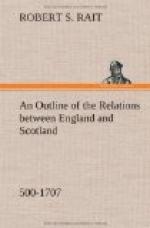From Major we turn with interest to the Principal of the University and King’s College, Hector Boece, who wrote his History of Scotland, at Aberdeen, about a century after the battle of Harlaw, and who shows no trace of the strong feeling described by Mr. Hill Burton. He narrates the origin of the quarrel with much sympathy for the Lord of the Isles, and regrets that he was not satisfied with recovering his own heritage of Ross, but was tempted by the pillage of Aberdeen, and he speaks of the Lowland army as “the Scots on the other side".[23] His narrative in the History is devoid of any racial feeling whatsoever, and in his Lives of the Bishops of Aberdeen he omits any mention of Harlaw at all. We have laid stress upon the evidence of Boece because in Aberdeen, if anywhere, the memory of the “Celtic peril” at Harlaw should have survived. Similarly, George Buchanan speaks of Harlaw as a raid for purposes of plunder, made by the islanders upon the mainland.[24] These illustrations may serve to show how Scottish historians really did look upon the battle of Harlaw, and how little do they share Mr. Burton’s horror of the Celts.
When we turn to descriptions of Scotland we find no further proof of the correctness of the orthodox theory. When Giraldus Cambrensis wrote, in the twelfth century, he remarked that the Scots of his time have an affinity of race with the Irish,[25] and the English historians of the War of Independence speak of the Scots as they do of the Welsh or the Irish, and they know only one type of Scotsman. We have already seen the opinion of John Major, the sixteenth-century Scottish historian and theologian, who had lived much in France, and could write of his native country from an ab extra stand-point, that the Highlanders speak Irish and are less respectable than the other Scots; and his opinion was shared by two foreign observers, Pedro de Ayala and Polydore Vergil. The former remarks on the difference of speech, and the latter says that the more civilized Scots have adopted the English tongue. In like manner English writers about the time of the Union of the Crowns write of the Highlanders as Scotsmen who retain their ancient language. Camden, indeed, speaks of the Lowlands as being Anglo-Saxon in origin, but he restricts his remark to the district which had formed part of the kingdom of Northumbria.[26]
We should, of course, expect to find that the gradually widening breach in manners and language between Highlanders and Lowlanders produced some dislike for the Highland robbers and their Irish tongue, and we do occasionally, though rarely, meet some indication of this. There are not many references to the Highlanders in Scottish literature earlier than the sixteenth century. “Blind Harry” (Book VI, ll. 132-140) represents an English soldier as using, in addressing Wallace, first a mixture of French and Lowland Scots, and then a mixture of Lowland Scots and Gaelic:




